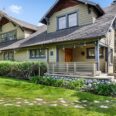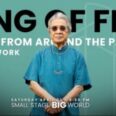
California’s median home price hit $899,560 in June 2025, which means working families would need $237,000 in annual income to qualify for a mortgage—but that’s over twice the state’s median household income. Meanwhile, Los Angeles permitted fewer homes in 2024 than it did in 2023.
But this is not a case of “there’s nothing to be done” – because the reason for our housing shortage is due to who is doing something: When you examine who participates in housing approval processes, you’ll find a disturbing pattern. Boston University researchers in 2017 and University of North Carolina, Chapel Hill researchers in 2024 analyzed thousands of public meetings about housing. They found that older, male, longtime-resident homeowners dominate participation in these meetings.
This holds true across LA County, where wealthy residents regularly pack city meetings to block proposals for new homes. And they’re mostly successful: Our teachers, nurses, and middle-class families are increasingly forced to live far from where they work.
But it’s also important to notice who’s missing from these meetings. Children comprised 27.3% of California’s population in 2000 but only 21.7% in 2020. Their parents—young families looking for entry-level homes—are notably absent from council meetings because they are too busy working. Progressive cities that talk a good game on promoting equity nevertheless amplify white homeowner voices in making decisions about housing – while silencing communities of color, young families, and working people.
SB 79, a proposed state law currently under consideration in the Legislature, would change this by allowing more housing to be built near our publicly-funded transit stops, without subjecting the homes to the endless processes dominated by wealthy homeowners.
The bill allows home builders to construct the types of homes that used to be legal in our cities – moderately-sized apartments, with heights that vary based on proximity to good transit. These types of homes are the backbone of an affordable city.
The result would be more homes where people want to live — close to jobs, good schools, and public amenities, and with easy access to public transportation.
Those opposing SB 79 argue it takes away local control. What they neglect is who controls those decisions now. Many council members elevate the concerns of wealthy residents and other powerful and connected players. What you rarely hear are the concerns of young families and new Californians looking for their first home. One person’s rising home price buries another family’s dreams of buying a home or living close to their work.
Our cities have had decades to fix housing shortages on their own. Progressive communities that pride themselves on equity have instead perfected systems that contradict their stated values. This system has brutal results: California is losing 700,000 residents annually to other states, with housing costs as the primary driver.
SB 79 is about more than housing policy—it’s about changing an archaic system that prioritizes established property owners over future ones. It’s about building homes for our children and newer Californians so the next generation can live in the communities they’ve always been proud to call home.
The choice is clear: continue a system where obstructionists control housing decisions at everyone else’s expense, or build communities that are affordable to working families. SB79 is about restoring a vision of California that has inspired past generations of Californians – immigrants, innovators, and visionaries – and building homes in our cities so future generations can have a shot at the California dream.
Jed Leano is a Claremont City Councilmember, Senior Policy Adviser at Inner City Law Center, and Board Member of the Los Angeles County Affordable Housing Solutions Agency. Prior to moving to Claremont, Leanol resided in Pasadena, CA where he served as the 80th President of the Pasadena Jaycees and National Legal Counsel for the United States Jaycees.


















